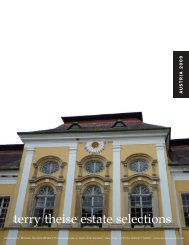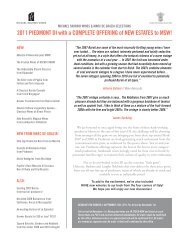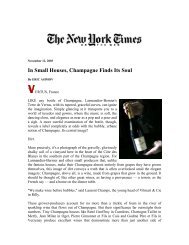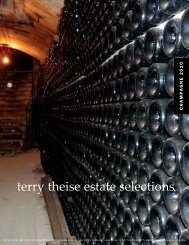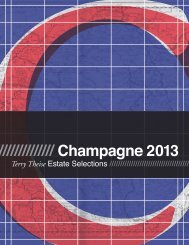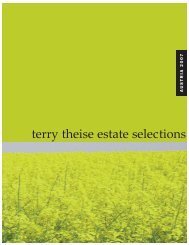German Catalog 2006 USE THIS ONE.qxp - Michael Skurnik Wines
German Catalog 2006 USE THIS ONE.qxp - Michael Skurnik Wines
German Catalog 2006 USE THIS ONE.qxp - Michael Skurnik Wines
You also want an ePaper? Increase the reach of your titles
YUMPU automatically turns print PDFs into web optimized ePapers that Google loves.
10<br />
I’m sure I<br />
didn’t convert<br />
the guy, and I<br />
p r o b a b l y<br />
exploited his<br />
good naturedness<br />
(plus put<br />
him on the spot<br />
in front of his<br />
date, hahaha),<br />
but good grief,<br />
the bullshit some<br />
people believe<br />
about themselves!<br />
<strong>German</strong> wines and food: perfect together!<br />
I don’t<br />
know a single<br />
human being who doesn’t prefer a ripe tomato to an<br />
unripe one. Shall we share a basket of unripe strawberies?<br />
Even a Granny Smith apple has some sweetness;<br />
we’d spit it out otherwise. Somehow the wine world<br />
seems to insist we ignore an otherwise routine animal<br />
tendency, and affect to despise sweetness. If we were true<br />
to our TRUE tastes, we’d fall over one another to get to<br />
<strong>German</strong> rieslings. Then there wouldn’t be enough wine,<br />
and prices would go up, and it’s probably good the way<br />
it is. . . .<br />
“The wines don’t work with food.” NOT!<br />
“The wines are impossible to understand.” The<br />
world is impossible to understand, using that logic. Look,<br />
<strong>German</strong> riesling is absolutely simple in its essence. Lateripening<br />
variety with naturally high acidity grown in the<br />
most northerly latitude possible. Long hang-time. Lots of<br />
opportunity to leach minerals from the geologically complex<br />
sub-soils. Roots have to sink to find water, and roots<br />
are able to sink because topsoils are poor. Topsoils are<br />
poor because<br />
most riesling<br />
is planted on<br />
mountainsides,<br />
to<br />
increase its<br />
chance to<br />
ripen, and rich<br />
soil would<br />
avalanche<br />
every time it<br />
rained. So the<br />
wines are<br />
fresh, vibrant<br />
and minerally.<br />
There. Now<br />
you know<br />
everything you<br />
need to know<br />
to “understand” <strong>German</strong> wine. The rest is fine-tuning.<br />
There’s some stuff to memorize, like there is everywhere<br />
else. If you care, you learn it.<br />
“There’s too many different wines.” This is true, but<br />
it’s inextricable from the jewel of the <strong>German</strong> wine experience,<br />
just as it is in Burgundy. Comtes Lafon could<br />
equalize the casks and produce one white wine and one<br />
red wine, as he might were he a Bordelais. It would definitely<br />
simplify things. Would you want him to? Would<br />
the gain in simplicity outweigh the loss of fascination?<br />
You tell me!<br />
Of all the grapes—not just white grapes, but all<br />
grapes from which wine is made—the Riesling is the<br />
most innately fine and noble. If it’s grown in its habitat it<br />
can give wines of incomparable vividness and complexity<br />
all by itself, without having to be tweaked or twiddled<br />
or eeked or diddled.<br />
Unripe berries, anyone? Not!<br />
As such I think Riesling, or indeed any wine with<br />
these virtues (Loire Chenins come to mind), can give<br />
the “discriminating” palate its greatest pleasure.<br />
What <strong>German</strong> wine teaches us is it isn’t the EXTENT<br />
of the flavor that tells, but its quality. We’ve all had<br />
numerous big wines which were dull and crude, and<br />
we’ve all had relatively little wines which simply tasted<br />
lovely. But there’s confusion over this issue, and it<br />
won’t hurt to repeat a couple of first principles. Bigger<br />
isn’t better in this view of the world: better is better.<br />
And the transparency of flavor of fine <strong>German</strong> wine<br />
allows you to consider its structure and enjoy its<br />
nuances, and teaches you that nuance and structure<br />
are important. Train your palate this way and you’ll<br />
be a better taster, as well as a more informed voter and<br />
a finer human being.<br />
Of course I can’t “prove” this, but here’s a telling tidbit.<br />
Some time in 2004 there was this massive thread on<br />
the eRobertParker bulletin board—I mean five pages,<br />
hundreds of posts—ostensibly over a review of Jefford’s<br />
The New France, but which quickly morphed into the



